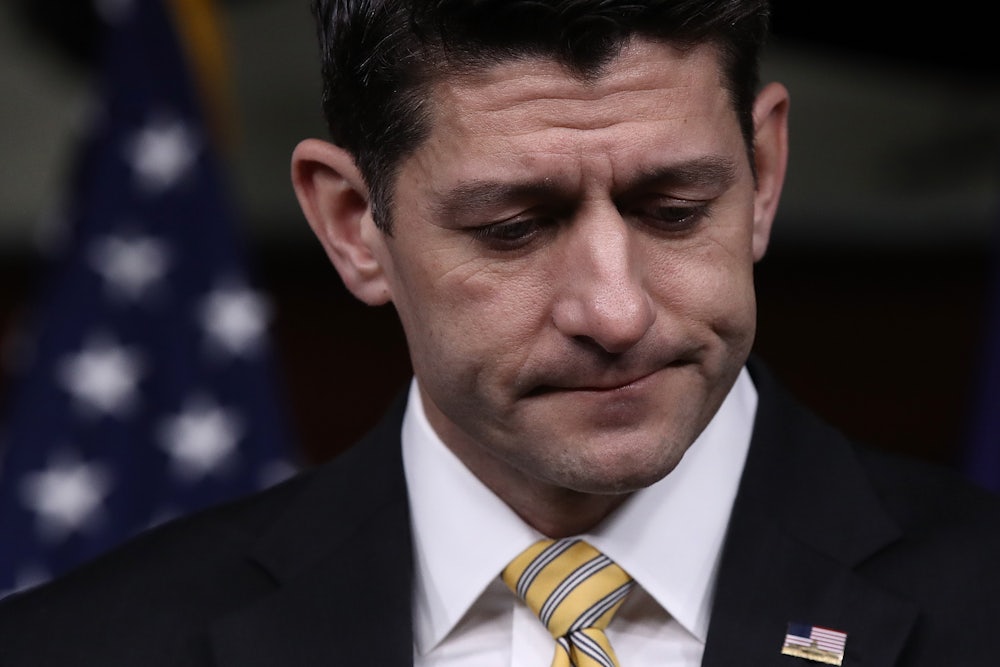Republicans spent more than seven years seeking unified control of government based on a promise to swing the pendulum of the American health care system in a more conservative direction. How they intended to accomplish this was never clear. When asked during that period of time to assess their progress, Republican leaders would insist an Affordable Care Act alternative was nearly complete, in the final stages of negotiations, and then they’d let the issue drop until another inquisitor broached the subject again.
In 2016, Republicans were awarded the power they sought. Their unexpected victory made it impossible for them to coyly promise a #BetterWay to structure the health care system, without ever saying how. It forced them, at last, to lay their cards on the table.
The legislation House Republicans introduced Monday, after weeks of internal struggle and secretive negotiations, suggests (as most liberals assumed) that they were never close to consensus at all. It has outraged right-wing pressure groups and baffled conservative health care experts. Health insurance consultant Bob Laszewski called the proposal “mind boggling.”
Libertarian writer Peter Suderman rightly wonders about the purpose of this crueler, less coherent, but still ideologically impure version of the Affordable Care Act. “In general, it’s not clear what problems this particular bill would actually solve,” he wrote at Reason, later noting, “It doesn’t go far enough for conservatives, but may not be generous enough to appease more moderate Republicans either.”
Laszewski suggests the answer must lie in the congressional budget process, outside of which repealing and replacing Obamacare would be subject to filibuster, but where the rules prohibit changing provisions of law that have little or no impact on federal deficits. “Anything else would require a bipartisan compromise with the Democrats,” he wrote. That answer explains why certain Republican nostrums (like allowing the interstate sale of health plans) don’t appear in the bill. But that doesn’t go nearly all the way toward explaining why Republicans have hitched themselves to an unsupportable, politically ruinous mess.
The problem this bill is meant to solve is that the entire professional right lied to the GOP base for seven years about the horrors of the Affordable Care Act, vowed to right all of its illusory wrongs, and now must answer for these hysterics. This bill lets Republicans in Congress pretend they were playing it straight with the American people the whole time.
The absence of a conservative health care consensus masks significant areas of agreement. Republicans complain that the federal government spends too much money subsidizing insurance, that the range of options available to people shopping for insurance are too constrained by regulation, that the individual mandate is tyrannical, and so on.
If they really wanted to move the health care system in a more conservative but sustainable direction, Republicans could take these complaints head on. They could propose to offer a money-saving catastrophic insurance option in every state insurance marketplace, which consumers could supplement with tax-preferred health savings accounts. They could eliminate the individual mandate by auto-enrolling, into this barebones plan, eligible people who don’t buy insurance on the open market.
Just as many progressives like the idea of a public option that gradually grows into something approximating Medicare-for-all, conservatives could implement changes on their own that would gradually devolve Obamacare (and perhaps the entire health financing system) in nearly the opposite direction.
But this path, and others like it, appear foreclosed to Republicans—not because the goals are anathema, or because the process won’t allow it, but because any considered initiative would expose their seven years of hyperventilating about Obamacare as a cynical, manipulative act. Transcending Obamacare is not repealing it; gradually reshaping the existing system until it looks substantially different is unresponsive to the emergency that the Affordable Care Act supposedly represented: The most dangerous piece of legislation ever passed in U.S. history, the worst thing to happen in America since slavery, and a one-way ticket to socialism.
Yes, ideological differences within the right would make reforming Obamacare difficult for Republicans, even under less constrained circumstances. And yes, the fact that Republicans lack Democratic buy-in, and thus must adhere to obscure budget rules, makes that task harder still. But these challenges don’t fully speak to why Republican leaders have, in a desperate clamor to appeal to all factions of the party, introduced legislation that appeals to none of them.
The full answer to that question lies in the irresponsible way Republicans conducted opposition politics during the Obama years. The hostilities they’re now encountering, as the sole stewards of the U.S. government, are the legacy of that behavior. They brought this entirely upon themselves.
